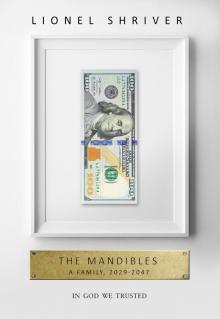- Home
- Lionel Shriver
So Much for That Page 6
So Much for That Read online
Page 6
Since that signal Friday evening a week ago, she had shared only bits and pieces about the tests. So her mention that weekend of one small technicality had stood out. Before the MRI, for which all jewelry must be removed, they had to do an extra X ray before sliding his wife into the tube. “Because they learned I was a metalsmith,” she’d said. “The imaging is magnetic. Metal screws it up. You can’t have any fragments or filings stuck to your body.”
He should have recognized why she had told him this: because she was proud. He shouldn’t have asked her, “So did they find any?” An effective but infuriating gambit increasing in frequency, she hadn’t responded to his question at all, which in this case meant no. They found no fragments or filings. She had worked so little in her studio for months that she could have taken the MRI just like anyone else. Even at such a juncture, he’d had to rub it in.
Your own little world. Her subterfuge would never have succeeded without his corresponding neglect. If he had noticed that despite the recent fullness around her stomach she’d grown thinner, he had made little of the observation, which was as good as not having noticed. He thought, I’d no idea that our marriage was in such disrepair, and then he remembered that until last Friday evening he was planning to leave her.
“That night,” he said. “You didn’t have to let me go on like that, about Pemba. You could have stopped me.”
“I was interested.”
“It wasn’t nice.”
“I haven’t been feeling,” she said, “nice.”
“How do you feel?” Shep was ashamed. In the last week he’d been solicitous, perhaps annoyingly so. Yet in the months beforehand he could not remember the last time he had asked her how she felt.
She took a moment. “Frightened. For some reason it was easier when you didn’t know.”
“That’s because you can give yourself permission, now, to be frightened.” He pressed her hand, just. “I will take care of you.” It was a big promise, one he would fail. But he would fail valiantly, and that was the promise he made to himself.
Dr. Edward Knox extended a hand to Shep, his clasp firm and generous. The oncologist gave off the astringent tang of antiseptic, as if he were one of those rare physicians who really did wash his hands. It was a smell Shep associated with anxiety. “Mr. Knacker, I’m so pleased that you could finally arrange to join us.”
In this phrasing Shep detected reproof, and his wife’s outrageous misrepresentations. In other circumstances, he would have taken her to task for them. Since now he would not, he sensed that taking her to task for anything was now pretty much a thing of the past.
The familiar air with which Glynis took a chair indicated that she had been in this office before. These two had a history together, and though Shep was “finally” here he felt excluded. He got the peculiar impression that for Glynis this office was a seat of power.
As the doctor assumed his swivel chair, Shep adjudged that the oncologist may have been in his latter thirties, although he’d grown ever less certain about ages. While he could still tell the difference between sixty and sixty-five, lately his juniors all entered an undifferentiated category of Younger Than Me, which was odd, since he had been that age before, knew what it felt like and how it appeared in the mirror. But from the perspective of a greater age it always turned out that you hadn’t, at the time, understood being thirty-seven at all, what it was, what it looked like. Unfortunately for current circumstances, younger people always seemed callow to Shep now, their confidence, which Dr. Knox radiated in pulses, hollow and unjustified—that is, enviably self-deceiving. Still Shep wanted to believe in this man, and rather hoped that with friends he went by “Edward” and not by the flip, less reliable-sounding “Ed.” Fit and trim, Knox probably chose fruit for dessert in the cafeteria and made time for the treadmill in the hospital gym; he practiced what he preached. Personally Shep always had a soft spot for medical practitioners who carried twenty surplus pounds and sneaked cigarettes in the staff parking lot. The hypocrisy was reassuring. From doctors, Shep had always sought less authority than forgiveness.
“I apologize that it’s taken us so long to arrive at a positive diagnosis,” Dr. Knox began, addressing himself to Shep. “Mesothelioma is notoriously difficult to identify, and we had to rule out a host of other more commonplace explanations for your wife’s fever, tenderness, abdominal swelling, and gastric dysmotility.” Shep didn’t know what dysmotility meant, but he didn’t ask, because then the doctor would know that this was one more of his wife’s symptoms that he hadn’t known about, or cared about, or noticed.
“After all, as I’m sure your wife has told you, peritoneal mesothelioma is very rare,” Dr. Knox continued. “And I won’t mislead you. It’s also very serious. Because the peritoneum is a very fine membrane surrounding the abdominal organs, almost like Saran Wrap, diseased tissue can be tucked into corners that are difficult or impossible to get at surgically.” Shep admired the doctor’s locution, which at least pretended that of course Shep knew what the peritoneum was; Knox was loath to imply that his patient’s husband paid so little heed to his own wife’s grave medical distress that he wouldn’t bother to look up her diagnosis in a dictionary. “And I’m sorry to say that symptoms of mesothelioma don’t generally make themselves felt until the cancer is fairly advanced. Nevertheless, we have a range of therapies at our disposal. New treatments, new approaches, and new drugs are being developed all the time. The survival rate has done nothing but improve.”
Shep knew all of this from the Internet, but felt it would appear impertinent for him to say so. Besides, it seemed important to allow the oncologist this formal introduction. Shep had already read enough to have registered that most of the nostrums in Knox’s grab bag of tricks were poisons. In the face of being able to do so little, it must have been comforting to the doctor to seem to be useful in this discursive way. His manner methodical but warm—he smiled encouragingly and looked Shep in the eye—Edward Knox had struck Shep from the start as very kind.
But even when doctors acted kind, the extent of their capacity to be kind was often out of their hands. However gently put, many a message that physicians were forced to deliver was cruel, and if it did not feel cruel it was a lie and thus was even crueler. Personally Shep didn’t understand why anyone would want to be one. Oh, certainly the tasks of stenting an artery and clearing a bathtub drain were technically akin. Yet a doctor was like a handyman who, some appreciable percentage of the time, had to knock on your door and say, I’m sorry, but I cannot clear your drain. That’s all the acting kind was good for: the I’m sorry part. And then he walks away and maybe he waves, leaving you with scummy standing water in your bath. Why would anyone want a job like that.
“And I do have some good news,” Knox continued. “First, as I assured you last week, Mrs. Knacker, the MRI did not reveal any anomalies in the pleural—in the lungs. Even more critically, I now have the lab report from the laparoscopy. Mesothelioma comes in two flavors, if you will—two types of malignant cells. The epithelioid are less aggressive, the sarcomatoid much more so. In the samples we extracted, only epithelioid cells were detected. That makes the prognosis considerably more optimistic.”
Glynis gave a schoolgirl nod, as if she had done something right. Shep was about to ask, so what prognosis is that? He opened his mouth and it was dry. He closed it, and swallowed. Instead he said, wanting to be grateful, to play his part, to enter into the spirit of gung ho that was clearly expected here, “Yes. That sounds like very good news.”
At once, he could not help but reflect that only a week ago “good news” comprised the value of his Merrill Lynch portfolio increasing by $23,400 without his lifting a finger. Their son finally passing second-year algebra. Randy Pogatchnik playing hooky at some golf resort, so that for three days working at Knack would be, if not quite the same as the olden days, at least collegial. Glynis being in a playful, indolent mood he could barely remember now, and up for watching an old episode of The Sopranos. Now on
a dime he was expected to enter a world in which “good news” comprised his wife’s abdomen coursing with vicious “epithelioid” cells rather than the even more vicious “sarcomatoid” kind and this information was meant to cheer him.
“As for where we go from here,” said the doctor, “you may want to commission a second opinion. It’s always possible that other specialists will recommend an alternative approach, but I thought I’d prepare you for the standard course of treatment for epithelioid mesothelioma. Assuming the diagnosis is confirmed, Mrs. Knacker, you’ll probably be scheduled for debulking surgery as soon as possible. This is to remove as much of the cancer as can be reached. We’ve located three patches of diseased tissue in the peritoneum. I’m afraid that the surgeons I have consulted concur that one of those patches is inaccessible. Both to shrink the little bit we can’t reach and to discourage further malignant cell growth, chemotherapy will almost certainly have to follow once you’ve recovered from the operation. To that purpose, a thoracic surgeon will install two ports in your abdomen. This way we can deliver intraperitoneal infusions of heated cisplatin that will wash over your organs, rather than administering chemotherapy through your bloodstream. Unpleasant side effects with this direct application should be markedly less pronounced.”
“Does that mean I won’t lose my hair?” asked Glynis, reflexively touching her crown, as if to make sure her hair was still there.
A shadow crossed the oncologist’s face, a sadness, a pitying, into which Shep could read that such a small damage to his patient’s vanity was bound to be the least of Glynis’s problems. “Patients react differently to treatments,” he said gently. “There’s no way to predict.”
“Besides, it grows back, doesn’t it?” said Shep. This was the role. He was supposed to be upbeat.
A second shadow, and this time one that Shep could not decode. “Yes, once treatments are completed, it certainly does,” said Dr. Knox, seeming to rouse himself. “Some patients find it grows back in even more thickly than before.”
Shep had the sudden impression that this visit, if not the whole song and dance from the X rays and the CAT scan to all the scalpels and “abdominal ports” and vile medications to come, was a farce, a macabre charade. As helpful and soothing as this doctor was trying to be, Shep felt distinctly humored. In turn, he also felt co-opted into a collusion with the doctor, whereby together they were humoring his wife. The joke was on Glynis. It was a wicked joke, a despicable joke, for which she would pay with every fiber of her being. He did not want to be a part of it. He would be a part of it.
“But before we go any further?” the oncologist continued. “Because this is such an unusual cancer, I have limited experience with the disease. Phelps Memorial has seen only two cases in the last twenty years. However, there’s a specialist in internal medicine at Columbia-Presbyterian, who works in tandem with a skillful surgeon. They both have extensive clinical experience with mesothelioma, and have a terrific reputation.”
“Are you trying to get rid of us?” said Shep with a strained smile.
Dr. Knox smiled back. “You could say that. Mesothelioma patients come to Philip Goldman from all over the world. You’re lucky, because for you two he’s effectively right next door. Now, he doesn’t come cheap. It’s likely as well that he’ll be out-of-network for your insurance. You’d need to get permission from your insurer if you want them to fully cover an out-of-network physician, and you’d certainly have a good case. But even if your provider declined, I’d urge you to consider Dr. Goldman. Your insurer would still pick up most of the bill; I don’t know the specifics of your health plan, but you might just be levied a higher percentage of co-insurance. And given the stakes … Well, I assume that money is no object.”
“Of course it isn’t,” Shep found himself saying. “We’ll pay whatever it takes to get Glynis well again.” Given his wife’s milk-money income from a chocolatier, the we was more farce. That the well again might also qualify as farce Shep was not yet prepared to contemplate.
Nevertheless, as Knox wrote out the contact details of this famously expensive shaman of the black arts, Shep considered this quantity now officially of “no object.” Of course it had no value by itself. Money was a means. But to ends not readily dismissed as “no object.” Food, shelter, clothing. Safety, insofar as there was such a thing, and thus also the capacity for rescue. Efficacy, power, sway. Ease, freedom, choice. Generosity, charity; if not love, for his children, wife, sister, and father, the palpable evidence of love. Education; if not wisdom, its prerequisite of accurate information. If not happiness, comfort, which could stand in for happiness in a pinch. Airplane tickets—experience, beauty, and escape. From the description of their apparent savior in Columbia-Presbyterian, raw, animal survival. For in the face of a virulent cancer, they would not simply follow directions, and marshal their forces of will; they would buy life. They would buy Glynis’s life, day by costly day, and in the end you would be able to affix a price tag to every one.
“So far, do either of you have any questions?” asked Dr. Knox.
“The side effects …” said Glynis. Of course, there was nothing “side” about them. They were effects—big, brutal, and anything but ancillary.
“Each drug and each patient is different. You’ll be alerted what to be prepared for, I promise. Let’s get through the surgery first. Not get ahead of ourselves.”
In the proceeding silence, Shep looked to his wife, then to the oncologist, beginning to panic. He did not want to shake hands and find himself in the car and have the omission, the elision, the craven evasion, steeping the inside of the vehicle like toxic emission fumes. But he also did not understand why he had to be the one to ask. Glynis might have raised this obvious matter before, but if so she hadn’t shared with him the upshot of such a discussion, and that seemed impossible.
When trying to get up to speed about a disease he’d never heard of before last Friday, through the following weekend Shep had spent hours at the computer. Know thy enemy, he figured. Yet on one medical Web page, well into its patient, hand-holding explanations of every test and treatment that mesothelioma patients might expect, he had finally arrived at a section headed “Survival Rates.” He had nearly memorized the first paragraph, having stared it down for so long:
Following on this page is quite detailed information about the survival rates of different stages of mesothelioma. We have included it because many people have asked us for this. But not everyone who is diagnosed with a cancer wishes to read this type of information. If you are not sure whether you want to know at the moment or not, then perhaps you might like to skip this page for now. You can always come back to it.
It was his initial impression that the authors of the text were being patronizing. His first impulse was to scroll down. He had always faced difficulty squarely. But this was different, if only because it was not his difficulty. It was bound, at points, to seem like his difficulty, but he would have to be mindful about that. Still, there was no question that as that paragraph burned on the screen, what bloomed in his gut was terror. He reached for the mouse. He withdrew his hand from the mouse. He did not scroll down. Taking the page’s advice, skip this page, he had returned to the same point on the same website three other times. He had never scrolled down. He wasn’t ready. In this office, with a fellow human being who could speak with all that useless kindness, it was time to scroll down.
“What are her chances,” said Shep, so leadenly that he was unable to lift the end of the sentence to imply the interrogative. “How long.” This was no juncture at which to be unclear. He formed the question fully. “How long has my wife got to live.”
But it was Glynis who spoke. “There’s no way to say. Every patient is different, you heard the doctor. Every patient reacts differently, and, as he said, new drugs are coming on the market all the time.”
His glance darting between them, Dr. Knox seemed to appraise the couple carefully. “It’s important to remain optimistic. I’ve often b
een pressed for a specific prognosis, and even when I’ve relented I can’t tell you how often I’ve been wrong. How many times I’ve predicted that a patient had such-and-such an amount of time left, and then years beyond the point at which I’d have expected to be sending flowers they’re thrashing their best friends at squash.”
“And it helps, you said,” said Glynis, “that I’m in very good health to begin with. I’m not overweight, my cholesterol is good, I exercise, I don’t have any complicating conditions, and I’m barely fifty years old.”
“Absolutely,” Dr. Knox chimed in. “Committing to a specific doomsday date is like going to war and choosing ahead of time the day on which you plan to lose. In medicine just as in the military, it’s a positive attitude that gets results.”
Shep was familiar with this talk of illness as armed confrontation: the “battle” with cancer, whose patients are invariably classified as “real fighters,” with “an arsenal” of treatments at their disposal with which to “defeat” an invasion of wayward cells. But the analogy felt wrong. His small experience so far was more one of bad weather. So it was as if the doctor had declared they would “go to war” with a snowstorm, or a gale wind.
“Yes, well, I didn’t mean to sound pessimistic, and there must be a huge variation …” Shep dutifully backed down. Still, he was surprised. Given her ferocity, her defiance, her darkness—of the two, he was far more constitutionally inclined toward the very optimism that Knox was promoting—he would have classed Glynis as the scroll-down type. Doubtless there were more things he would find out about her as this proceeded. Maybe you never really knew anyone until they were dying.

 Ordinary Decent Criminals
Ordinary Decent Criminals The Female of the Species
The Female of the Species We Need to Talk About Kevin
We Need to Talk About Kevin A Perfectly Good Family
A Perfectly Good Family So Much for That
So Much for That Checker and the Derailleurs
Checker and the Derailleurs The New Republic
The New Republic Double Fault
Double Fault Should We Stay or Should We Go
Should We Stay or Should We Go The Post-Birthday World
The Post-Birthday World Big Brother
Big Brother Game Control
Game Control The Mandibles
The Mandibles The Standing Chandelier
The Standing Chandelier Property
Property So Much for That: A Novel
So Much for That: A Novel